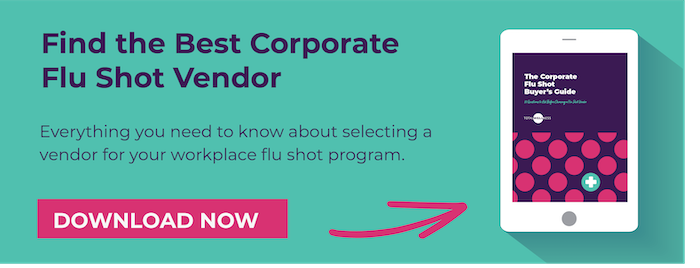August is National Immunization Awareness Month (NIAM), a campaign to spread awareness about the importance of immunizations for people of every age.
After the 2019 measles outbreak, it shouldn’t come as a surprise that vaccines will be an important part of healthcare discussions in the upcoming months. And, as flu season grows closer, the great debate of vaccines is going to be all over the news again.
NIAM is a great time to dispel vaccine myths and instead spread the facts that immunizations are important for kids and adults alike.
Here’s a look into why employers may want to encourage the appropriate vaccinations for workers each year:
How Do Immunizations Work?
The immunization system protects against viruses and germs by creating antibodies.These antibodies will attack the next time you're exposed to the same threat. While the human body is often great at fighting off infection, with dangerous diseases, the body may not be able to produce enough antibodies in time to fight off the disease.
By administering vaccines with weakened, dead or even part of the virus, it allows the body to develop antibodies that protect people without actually getting sick. This is why childhood vaccinations are so highly recommended. Pregnant women can also provide immunity to their unborn children through getting shots like the flu vaccine, MMR, and Tdap.
When whole communities are vaccinated, people who can’t be vaccinated due to age or health reasons are also protected since they are less likely to be exposed to the disease. This is commonly referred to as herd immunity.
Who Should Be Immunized?
Vaccines start as early as birth and run through adulthood.
Children in the U.S. receive a schedule of vaccinations for more than a dozen diseases. Many of these are life-threatening conditions like measles, polio, mumps, rubella, rotavirus, tetanus, diphtheria, and whooping cough.
Depending on lifestyle and health issues, adults should be immunized as well for health concerns like the flu, shingles, tetanus, and Hepatitis B.
Additionally, people who run an increased risk for certain diseases may need additional vaccines. This may include:
- Gay or bisexual men
- Health care workers
- People with specific health issues
- Military members
- Travelers
- Pregnant women
You can find the recommended adult vaccine schedule here.
Do Vaccinations Have Side Effects?
All medications can have side effects. Luckily, most vaccine side effects and immunization risks are usually mild and may include a low-grade fever or mild pain at the shot site. Most symptoms are gone within a few days of being given the shot.
Share the Facts During National Immunization Awareness Month
Vaccinations work so well that people may not realize how important they are to keeping communities — including workplaces — healthy.
Many childhood diseases are prevented with vaccinations, but the germs still exist. Being up-to-date with immunizations is the only way to keep dangerous outbreaks from happening and spreading fast. As an employer, raising vaccine awareness can protect not just your employees but also their families, too.
Spread only the facts during National Immunization Awareness Month to avoid creating fear surrounding this hot topic. Reliable sites to share information from include the Centers for Disease and Control Prevention (CDC) and any handouts from your local health department.
Want to protect your employees from this season’s flu? Consider setting up an on-site flu clinic!



